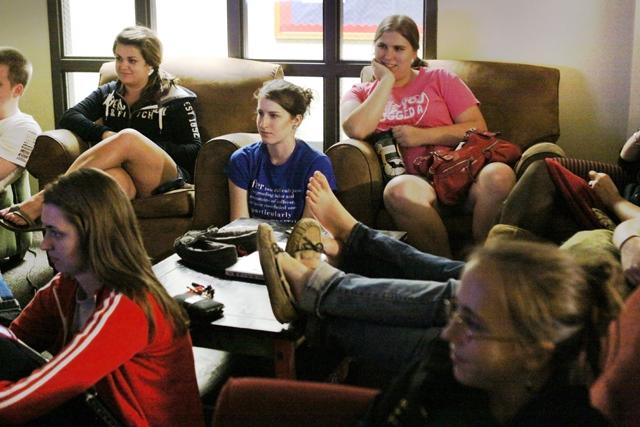Though the calendar year may be winding down, the television year is just beginning, as many series start their new seasons. For N.C. State students, this provides a way to unwind during the week, take a break from their studies, and gather with old and new friends as they crowd into residence hall lounges to watch their favorite shows together. Television for many students is a social event, as freshman in electrical engineering, Paula McDonald explains.
“Having people to watch [TV] with is half the experience,” McDonald said.
The group setting can mean slightly different things for different people, and depends upon the show. Programs like ABC’s Lost, which ended its final season earlier in the year, are notorious for their long, complicated plots and continuity between episodes. For viewers hoping to jump into these sorts of shows mid-run, this approach can be problematic.
Ben Holden, freshman in mechanical engineering contrasts the continuity approach with other shows like CSI: Crime Scene Investigation, in which each episode more or less had its own self-contained story.
“[In Lost] you definitely needed to see most of the episodes to understand how the characters are interacting and what is going on,” Holden said. “I think CSI is a good example of the alternative. You can watch any random episode and be fine. It puts the episode’s plot first where Lost had one plot that it went with. When I have time on my hands, it’s easy to watch shows like Lost, but I think having self-contained plots is better for the viewing audience because you can jump in anytime.”
Some shows, like Fox’s Fringe try to tread a middle ground between these two methods. Clayton Price, freshman in engineering, explains.
“Fringe is interesting because it has a plotline it follows, but most episodes you can watch and catch on to what is going on in that episode,” Price said. “I like how if I happen to miss an episode, I won’t have a problem watching the next episode and then going back and watching the one I missed.”
In order to sort out his thoughts and theories, Price watches Fringe with other fans of the show in his residence hall’s lounge.
“It’s more exciting that way,” Price said. “Some of us will remember things that other people forgot and we’ll just bring up interesting points and say where we think [the story is] heading. [Shows like Fringe] benefit from being watched together because some people will remember details others don’t. You get more perspective on the show after discussing it.”
A show doesn’t need to be complicated to be watched together, however. Glee, for example, is extremely popular among television groups across campus. In Glee‘s case, however, watching a show together is mostly centered on social interaction rather than the analysis that Fringe groups like to focus on. A frequenter of these group watching sessions is Rachel Poe, freshman in engineering.
“It’s really about a high school glee club and its evolution, but the reason I watch it is just for the music they do,” Poe said. “They redo all kinds of famous songs. It has a cultural impact. And it’s more fun to watch with a group of people because it’s fun to talk about it during the commercials. It’s more fun to be with people.”
TV groups have also introduced some students to new shows they would have never been interested in without the influence of their friends.
“I’ve watched The Big Bang Theory,” Poe said. “I had never watched it before, and only did because there was a big group saying they were going to, and it was interesting. It was funny. I’d watch it again.”
For many, there is no question – groups are the only way to watch television.
“If I weren’t in a group, I feel like I would have to call someone right afterwards and ask, ‘did you watch that last one?!'” Paula McDonald said.
“It’s easier to like things in a group because you’re laughing together; you’re trying to figure it out at the same time as everyone else, sort of like asking ‘did you catch that reference?’ to everyone else,” Ben Holden said. “It’s just easier to watch it in a group. Everyone is more motivated to watch it then and there, so you’re less likely to skip an episode because you can tell there is a big group going together so you’re like ‘I might as well go watch too.'”
Groups are meeting in residence hall lounges all over campus whenever Glee, Fringe, The Big Bang Theory or another big show is on TV, and are normally as easy to join as walking in and sitting down.








